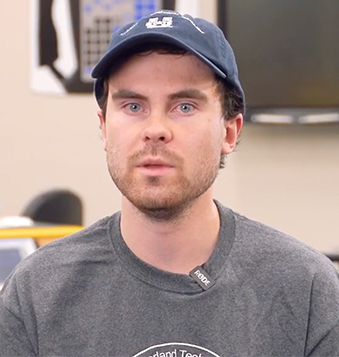About Robotics, Automation, and Controls
Our Robotics, Automation, and Controls emphasis area is a unique program that provides students with hands-on experience to prepare them for a successful career in the field. By completing this program, students will have the skills and knowledge needed to work as automation technicians, control systems engineer technologists, robotics engineer technologists, and more. They will be able to design, program, and maintain industrial automation systems, and optimize processes for maximum efficiency and productivity.
To ensure that our students receive the best training possible, we have partnered with Bridgerland Technical College, Davis Technical College, and Ogden-Weber Technical College. Students will complete two certificates at one of these technical colleges, earning them a total of 48 credits towards this emphasis.
What You Will Learn
In this program, you'll learn about the latest technologies used in industrial automation and control systems. You'll gain hands-on experience with industrial robots, programmable logic controllers, work cell creation, industrial networking, electronics, human-machine interface programming, and fluid power systems. By completing this program, you'll be ready to launch your career in the exciting field of automation and controls.
What Will it Be Like?
Job Options for Graduates
- Automation Engineer Technologist
An automation engineer technologist is an individual who improves the efficiency of various manufacturing and computer systems by automating certain parts of the systems to do work on their own. They revise existing technology so that it requires less human interaction, and they monitor the performance of the changes they make. Sometimes, an automation engineer may design entirely new technology to automate a system. - Controls Engineer Technologist
A controls engineer technologist designs and updates machines with multiple functions. This includes automobiles, planes, and other equipment that regularly change and move while operating. They combine mathematics and basic engineering to develop complex solutions that help these multi-functioning systems operate properly for customers to easily use these products. - Controls Systems Engineer Technologist
A control systems engineer technologist’s duties include designing, building, and maintaining instrumentation, monitors, and other equipment used to control complex systems. Some examples of these control systems include navigation networks, production machinery gauges, and computer system monitors. It is the control systems engineer’s job to maintain safe and efficient field operation of the equipment and to ensure the safety of those utilizing the equipment. - Product Safety Engineer Technologist
A product safety engineer technologist is a professional who is responsible for ensuring that the products manufactured by a company meet all the necessary safety standards and regulations and are free from potential hazards. They perform tests and evaluations, analyze data, and recommend changes to improve the safety of the products. - Process Maintenance Technician
A process maintenance technician schedules repairs for faulty equipment or damaged structures. They also perform general maintenance of the facility and grounds. In addition, they perform periodic quality checks on all equipment and systems to ensure they are up to standards. - Systems Integrator
A systems integrator Implements, integrates, and troubleshoots computer, information, and software systems, including software and hardware components Ensures that data flows from one application to another. Synchronizes information and data systems ensuring interoperability between data sources.
Starting salary is approximately $75,000-$100,000+
What Our Students are Saying

John Robinson
Technology Systems: Robotics,
Automation & Controls Graduate


